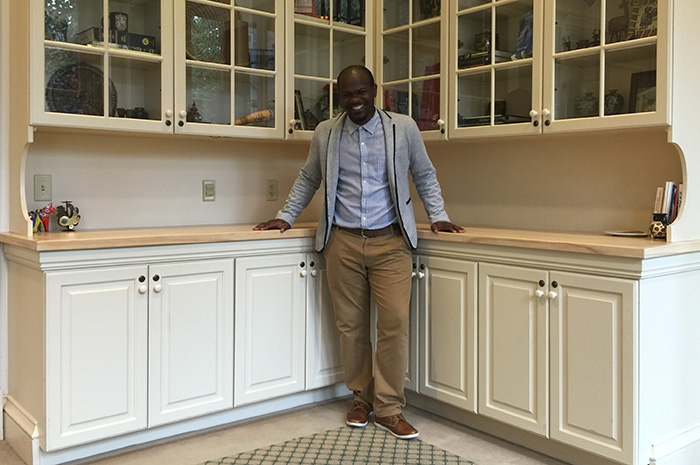Leadership, Mentorship and Social Equity

Isaiah Gibson ’17
Like all students who are the first in their families to attend college, Philadelphia native Isaiah Gibson ’17 faced many challenges during his first year on campus, and today, he helps ease others’ transitions to college as a student leader and First-Year Mentor. And after an internship opened his eyes to racial injustice in America, Gibson was inspired to help effect social change. After Dickinson, he plans to help revitalize a struggling educational system by working with the Philadelphia Board of Education while continuing his education and researching racial-justice issues.
Majors:
Sociology and law & policy.
Clubs and organizations:
First-Year Mentor, Intramural sports (referee), overnight host for prospective students, MANdatory, Strategic Planning Committee, Emerging Leaders retreat (mentor) and Young Alumni Trustee Selection Committee.
Honors/scholarships/awards:
Building Blocks Award and Samuel G. Rose ’58 Scholarship.
Favorite professor:
[Charles A. Dana Professor of Sociology] Susan Rose, because she supports me and believes in my academic ability. Professor Rose has been there for me in and out of the classroom. I am truly blessed to have her to guide me through my college experience.
Post-Dickinson plans:
I would like to work for the Board of Education in Philadelphia. I want to be a part of a process that works to bring educational opportunities to inner-city youth. I want to help youth understand that they can use their intellect to be successful; I will encourage them to not buy in to the idea of reaching the American Dream through athletics or entertainment. I also plan to pursue a J.D./Ph.D. in sociology and to use these degrees to fight for the freedom of innocent people. In my older years, I would like to be a law professor and an author who sheds light on the perpetual racial injustice of this nation.
If I could have dinner with anyone, living or dead, it would be …
… Frantz Fanon, in a small Jamaican restaurant.
Proudest accomplishment:
I’m proud to be Denise Gibson’s son and to break the barriers between academia and my family by becoming the first in my family to go to college.
About my internship:
I interned at Columbia University this summer. I became interested in this internship because it was created for underrepresented persons who have the potential to become academics and pursue graduate studies. Through this program, I got insight into what it is to be an academic of color. The scholars stressed the importance of conducting research that was relevant to people of color. In addition, they encouraged us to challenge the system and to produce work that helps the cause of our people.
About my research:
I researched how a historically black church engaged a predominantly Latino neighborhood on issues of social justice within the larger context of neighborhood change. I chose that topic because it was right after the Mother Emanuel AME shooting in South Carolina, and I had noticed that the Hamilton Heights neighborhood [in Northern Manhattan] was saturated with churches. Many of them were small storefront Dominican congregations. St. Luke AME was the largest of them all.
Through this research, I learned that historically black churches and black social movements [run] parallel in black history. I learned how black churches continue to fight for the liberation, equality and safety of black and brown persons living under the rule of a racist government built to maintain white supremacy and privilege.
Most important thing I’ve learned (so far):
I have come to realize that the United States fosters a culture of racism, classism and sexism that marginalizes people. Now I understand what it means to be a black man in American society and how policies implemented by the United States work to oppress and destabilize black and brown people. I'm beginning to understand systematic injustices from firsthand experiences—my personal life of being raised in poverty and the frequent police stops as a child. I now know that the prison industrial complex thrives off of the imprisonment of my body. This is where my motivation to be successful comes from.
Learn more
- Department of Sociology
- Department Policy Studies
- Meet the First-Year Mentors
- Interns in Action
- More Student Snapshots
- Latest News
Published December 18, 2015